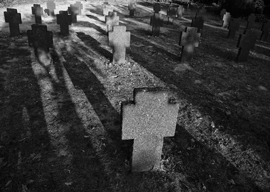
August 10, 2014

Source: Shutterstock
“Are you ready for life changes?” the advertisement that came through the Internet asked me.
In general, the answer is “No, I am not ready.” I don”t like change, and though I know it is coming whether I want it to or not, it always catches me unawares. For example, when I look in the glass I always wonder who that old man is, staring back at me and mimicking my every facial gesture. Why can”t the world stand still for a moment, so that we can savor life rather than having to adapt all the time”for example, to osteoarthritis?
What, exactly, are “life changes” anyway? A clue was offered by the arrival of another advertisement, for advertisements on the Internet are like troubles: they seldom come singly. This one offered me peace of mind through burial insurance.
Death is indubitably a life change, despite Wittgenstein’s denial that death was an event in life. For more than two millennia philosophers have been trying to persuade us that death is either nothing at all or devoutly to be wished, a good thing, but on the whole mankind has not concurred. The philosopher Bernard Williams thought that it was death that gave meaning and purpose to life, by analogy with the fact that an article without a deadline would never be written; and therefore (I suppose) we should be grateful that we shall die. Williams, in short, considered death as a kind of existential deadline. But while death in the abstract may be a good thing, death in particular tends, in the overwhelming majority of cases, to be a bad one, hence the relative infrequency of suicide. And other philosophers have thought that, since we did not suffer from our own lack of existence before we were born, so we have nothing to fear from our forthcoming lack of existence. For most of us, though, the fact that we have existed between two eternities of oblivion makes a significant difference to the prospect of the second of them.
These days, anxiety pursues you, if not beyond the grave exactly, at least up to the grave. Burial insurance is an old tradition, of course, and was sometimes the motive of murder, particularly of infanticide. People feared a pauper’s burial in an unmarked and possibly a communal grave, as if it were the ultimate ignominy to be heaped on a person, a kind of certificate of existential failure, but these days the fears are more”I was about to say down-to-earth.
It seems that dying these days is an expensive business, its cost increasing faster than the cost of living. The average death in England, I read, costs £10,000, if you count its associated funeral, which is more than the disposable household savings of a very large proportion of the population. This puts a new light on the antisuicide dictum of James Kirkup, the poet, that the world is not worth dying for.
I used to work in a hospital ward in which all the patients had made a suicidal gesture. Very few really wanted to die; most of them wanted to bring relatives or lovers to heel, and they frequently succeeded. One girl of about sixteen left a note saying, “Dear Mum and Dad, Please don”t blame yourself, this is not your fault””meaning, of course, that this is entirely your fault and unless you change your minds and allow me to stay out later than one in the morning, I”ll do something much more serious, and then you”ll be sorry.
But from time to time there were truly suicidal people in the ward, whose cases were often tragic in the extreme. (Even many of the cases in which suicide was not really intended were truly tragic.) There was a ward television that was perpetually on to keep the patients entertained as they suffered”though there are few things more agonizing than compulsory television for those who do not want it”and it so happened that one day, when there was an exceptional number of people in the ward who were truly suicidal, there was a lively studio discussion on the television about the shortcomings of undertakers, their various means of cheating families, charging too much, failing to meet their obligations, skimping on coffins, and so forth. Furious widows berated the representatives of the undertakers, accusing them of being worse that the body-snatchers who supplied corpses to the anatomists for personal gain early in the 19th century. Whether this discussion was quite the right thing for the patients I am not sure. On the one hand it might have resolved them to avoid undertakers as long as possible; but on the other it might have confirmed them in their most dismal apprehensions of the world. Furthermore, as punishment of others, particularly close relatives, is one of the principal motives of suicides, the prospect of delivering themselves into the hands of undertaking sharks might strengthen their determination to kill themselves.